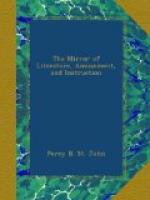That occurrence is now three years since, and it was only the other day that I again met the pair of turtles. Dropping in rather late at a card-party, I beheld them sitting vis-a-vis at one of the tables, playing together against an old lady and gentleman, before whom Mrs. L—— thought, perhaps, it was not necessary to appear very fashionable towards dear Harry. With the requisite ceremonious unceremoniousness so popular at present, I took a chair behind him, and annoyed him every moment by remarks upon his wife; of course all highly nattering to both.
“My love, you have played that card wrong—very wrong.”
“Did I, my dear?” replied Mrs. L. smiling languidly, and looking in his face more as if she was admiring the elegant turn of his forehead, and the spirited expression of his dark eye, than as if she minded what he was saying—“’tis indeed—very.”
“’Tis what?”
“Oh! were you not speaking of something? I beg pardon, love—I thought you spoke.”
“And so I did, my dear. I told you that card was played most abominably.”
“I dare say, my love;—[still gazing in his eyes and smiling]—I know I’m very stupid,”—[playing a card.]
“Well, you have taken a curious way to mend matters—that last play was a thousand degrees worse than the other.”
“I dare say, my love,—[looking in his face, and continuing to drawl and simper in the manner which we might imagine of Shakspeare’s little shepherdess—
“’Sweet youth chide on—I
had rather hear thee chide
Than others woo—’”]
“But tell me, love, when I play wrong,” [playing again without taking her eyes from his, even to look at her card.]
“I had much better leave you to yourself,” said L.
“‘You will be compelled to take refuge in fits of sullenness,’” muttered I, quoting from my former prophecy.
“My dear,”—[pronounced just in the same way as he might have said, ’you fool,’]—pray open your eyes.”
“Perhaps in rudeness,” I continued.
“There again!” cried poor L——, who seemed in danger of being ruined by the admiration of his wife. “It is not possible for a card to be played worse than that. Your head, my dear, must be as confused as your boudoir.”
“A bit of bobbin here—a hat feather there,” I continued, growing malicious.
“Sir,” cried L——, starting round in a passion. Fixing his eyes for a moment on my wooden phiz, however, he burst into a fit of laughter, and then as suddenly assuming a most doleful change of countenance, he squeezed my hand and said to me apart, in a tragic tone, “Ah, my dear friend, you were right—you were right.”
“He that would lead a happy married life,
First learn to rule, and then to have,
a wife,”
say Beaumont and Fletcher—and a pleasant
aphorism it is too—and a wise and
useful—but with a slight alteration, a
periphrasis comprehending advice not less
to the purpose may be presented—




